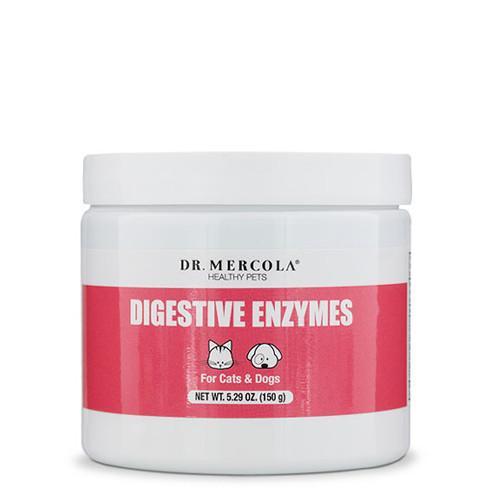Digestive Enzymes for Pets | Dr Mercola | 150g
£22.95 £17.95
As your pet ages, production of enzymes declines. And this can lead to unwanted consequences for your pet.Enzymes could drastically improve your pet’s digestion and absorption of nutrients, and contribute considerably to your pet’s well-being.BenefitsWhen used after meals, the enzymes circulate throughout your pet’s body via the bloodstream, helping to:Support the healthy circulation of blood through arteriesMaintaining normal immune functionClear cellular debris while cleansing tissueStimulate healthy new cell growthPromote normal cell growthPromote a healthy immune responseSupport normal detoxification processesClear away undigested proteins, cleansing the lymph and bloodAdditional InformationThe “Magic” of EnzymesOne of the vital forces and energy of life, enzymes are tiny protein molecules found in every living cell.They’re responsible for countless activities and functions involving energy production, metabolism, detoxification, and so much more.Just to convey how powerful these molecules are, as you read this one sentence, millions of biological reactions requiring the actions of enzymes are occurring in your pet’s body.Here are some of the many benefits of enzymes:Supports the immune systemAids the absorption of vitamins and minerals from foodPromotes normal body weight without hunger cravingsPromotes respiratory healthHelps reduce minor food sensitivitiesHelps promote normal cell growthSupports healthy teeth and gumsHelps maintain healthy cholesterol levels that are already within the normal rangeReduces occasional bloating, gas, heartburn, and constipationLessens skin irritation and excessive sheddingProvides more energy due to better utilisation of nutrientsHelps remove toxins from the bodyPromotes comfortable movement of jointsAs you can see, enzymes function in so many wondrous ways beyond digestion.Why Digestive Enzymes May Be So Beneficial to YourPet’s Well-BeingThe two main types of enzymes most important to your pet’s well-being are metabolic and digestive enzymes.Metabolic enzymes function throughout your pet’s body to help carry out the critical bodily functions of building and maintaining every cell, tissue, and organ.Digestive enzymes work in the stomach and intestines to break down the food your pet eats.The four basic digestive enzymes are:Protease helps break down and digest proteinAmylase helps break down and digest carbohydrates and starchesLipase helps break down and digest fatCellulase helps break down fibreYour pet’s body depends on enzymes in her digestive track to unlock vitamins, minerals, and other important nutrients from the food so they can be absorbed.What Happens When Your Pet Lacks Sufficient Digestive EnzymesWhat happens if your pet doesn’t have enough enzymes in his digestive track?First, his body robs critical metabolic enzymes from other important tasks, such as immune function, as digestion of food reigns as a high-priority, survival activity.Second, a lack of digestive enzymes may result in incomplete digestion, allowing partially digested food particles to enter the bloodstream directly from the large intestine.Less-than-optimal health may be at least partially due to your pet’s body’s response to undigested food particles circulating in the bloodstream.The Problem With Today’s Pet DietsIf you feed your pet a commercial dry or canned diet, most likely they are enzyme-deficient.For a food to maintain its natural enzymes, it must be uncooked and unpasteurised, non-irradiated, and untreated with any source of heat.To be frank, today’s commercial pet foods lack healthy natural enzymes. In essence, the food is dead, over-processed and in-organic.Production of both canned food and dried kibble require very high temperatures, which destroy any live enzymes present in the food.If the manufacturer adds enzymes, they often break down when exposed to air, light, and the processing needed for the food’s long shelf life.Additionally, pet food processing can cause food nutrients to become chemically trapped, which can cause them to pass through your pet’s digestive system unutilised. Enzymes are needed to help unlock these food nutrients and aid in digestion.Your Pet’s Best Insurance for Protecting Their Fragile Enzyme BankWhether you feed your pet a healthy homemade or frozen species-specific diet, a canned or a dried kibble diet, she will likely benefit greatly from supplemental enzymes.Supplementing with enzymes helps ensure she can completely digest her food without dipping into that fragile bank of metabolic enzymes.When you feed your pet enzymes with her meals, they aid in digestion. When you feed the exact same enzymes at other times, they work systemically for metabolic purposes.Using enzymes for total body systemic use is not new. Many holistic veterinarians have been employing this secret arsenal for years.IngredientsUsing only the finest ingredients available, Dr Mercola has selected these enzymes to include in Healthy Pets Digestive Enzymes:Betaine HCl – break down proteins into peptides and amino acids and fats into triglyceridesBromelain (pineapple) one of the safest and most powerful enzymes to help break down and digest proteinPapain (papaya) a natural plant-sourced enzyme that works together with bromelain to digest proteinPancreatin an animal-based pancreatic enzyme providing all three of these enzymes:Protease helps break down proteins into amino acids for digestionAmylase for splitting and breaking down long-chain carbohydrates, including starch and glycogen (the energy-storage molecule in animal tissue) for digestion in the small intestineLipase helps break down and digest fats Unlike so many animal supplements available today, the ingredients used in Dr Mercola’s Healthy Pets Digestive Enzymes are human grade.


